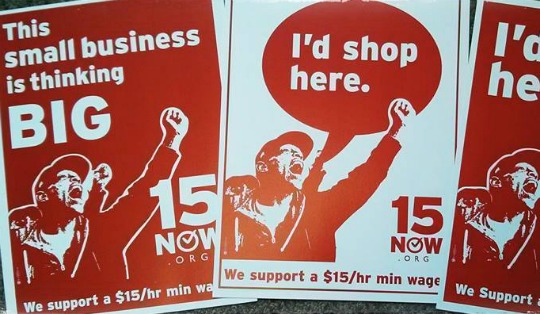That’s the summarized reaction by progressive activists in Seattle to a proposal by the city’s mayor, Ed Murray, presented to the city council this week that calls for a phased-in minimum wage hike to $15 an hour over four years.
Though the $15 minimum wage would make Seattle’s one of the highest in the country, Kshama Sawant, the outspoken member of the Socialist Alternative party on the City Council and the de facto leader of the city’s $15Now coalition, said she could not support Murray’s plan as written because of its numerous complexities, loopholes, and a slow implementation.
That a proposal to raise the wage this much is even supported by the mayor’s office and business interests in the city, said Sawant, “is a testament to how working people can push back against the status quo of poverty, inequality, and injustice.”
However, while saying the mayor’s proposal was the direct “result of the pressure” from those pushing from below and should be welcomed for that reason, Sawant said that the “unfortunate” reality is that the mayor’s plan “also reflects the attempt of business to water down what the working people of Seattle” have consistently said they want.
“While business has lost the public battle on [having a $15 wage],” she continued, “they were given a seat at the table to pursue their wish list, while low-wage workers were left out.”
On Murray’s plan, The New York Times reports:
Mr. Murray, a Democrat and former state senator, formed his special committee on income inequality this year — headed by a labor union leader and a business executive — and gave them three months to find common ground. While running for mayor last fall, he, like Ms. Sawant, pledged to support a $15 minimum wage. The result, in an agreement reached late Wednesday, with 21 of the 24 members supporting the plan, he said, was a two-tiered minimum-wage structure. Employers with more than 500 workers — no matter where those workers are around the nation — would move on a faster track toward $15 than smaller employers. Tips and employer-paid health care benefits also would be factored in getting to the $15 level for smaller companies, at least in the earlier years of the plan. The result is a disparity, at least in the rate of pay increases, if not the final destination: Some workers would get to $15 an hour as early as 2017, with a cost-of-living adjustment after that tied to the Consumer Price Index, while other workers, at smaller companies, would not see $15 until 2021. Washington already has the highest statewide minimum wage in the nation, at $9.32.
It is all those caveats and complexities, say Sawant, which make the deal untenable for those living in poverty who should not be forced to wait for one more day, let alone many years, for increased pay.
“Every year of phase-in is another year that a worker has to live in poverty,” she said. “So we have to keep fighting. We will keep building the pressure from below.”
Detailing her objections to four specific issues— the ‘four year phase-in for big business’; an ’11 year delay’ for small business; a ‘tip credit’ for waitpersons and others; and ‘health care deductions’—Sawant was adamant, declaring:
I don’t support phasing-in for big business. McDonalds and Starbucks have no justification for keeping their workers in poverty for a day longer. For workers in Seattle, 11 years is a very long time to wait for a decent wage. Every year of a phase-in is another year of poverty for workers. I do not support tip credit. Tip credit has proven itself to be a cause of poverty for tipped workers in the 43 states in which it exists. It also overturns the 1988 democratic majority vote by Washington State workers. I do not see why businesses should get a healthcare credit. Business executives don’t have to make a choice between a decent wage and health care for their families. Why should workers have to make this false choice? Workers make this city run, and they deserve wages, tips, and healthcare.
The proposal for a $15 wage supported by Sawant and the $15Now coalition, on the other hand, has:
- no phase-in for big business. Big business had to pay 15 now
- a much shorter, 3 year phase-in for small businesses and nonprofits
- no tip credit or healthcare credit
Sawant says her proposal deserves a vote in the City Council and she has vowed to continue the fight to give the people of Seattle the wage measure they have asked for and deserve by collecting signatures to put her more aggressive proposal on the city ballot in November.
“This is a historic moment to recognize the power of grassroots organizing,” Sawant declared. “It is a call to action.”

















